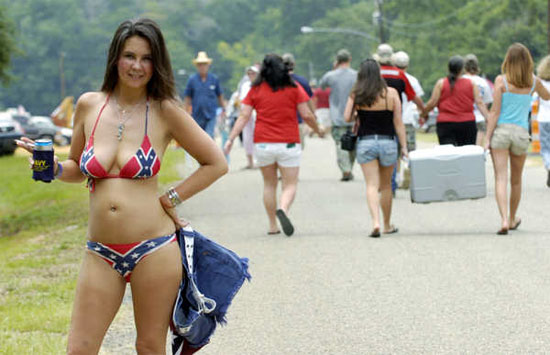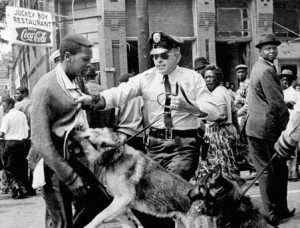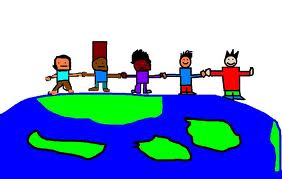Here’s the scene: I’m in a karaoke bar in suburban Birmingham, AL. The audience is split roughly 50/50 black/white. Song selection during the evening was pretty unremarkable.
Until.
A black woman gets on stage and starts to sing “Redneck Woman” by Gretchen Wilson:
And then a white woman gets on stage to join her halfway through the song.
I couldn’t believe either my ears nor my eyes. Several days after the incident, I’m still trying to process it. Was this a post-racial moment? Or just a racially confused moment? Either way, it set my Overthinking It senses into overdrive, and I knew I had to hash it out in a post and get the opinions of our readers on this matter.
Before we get to the heart of the matter, let’s get our terminology straight. There are a couple of loaded words in the first few sentences of this article:
Post-Racial

I know, this is ugly and monstrous, but sometimes the truth ain't pretty.
In our last article on the subject, OTI writer McNeil put forward the idea that the Black Eyed Peas, with their multi-ethnic composition, diverse fanbase, and positive lyrics about tolerance and cooperation, might represent the “post-racial” America that many were talking about around the time of Barack Obama’s campaign for and election to the presidency. In the larger political discourse, the idea that we’ve reached some sort of post-racial nirvana quickly faded when everyone took stock of the ugly resurgence of American racism in their midst (directed mostly at the President but also to other ethnic minorities, particularly Hispanic immigrants).
But as evinced by McNeil’s thoughts on the subject, the concept of a”post-racial” America where race, if not doesn’t matter, then doesn’t divide us like it used to, is still a part of the political discourse. It’s attractive to us for obvious reasons. Americans across the political spectrum desperately want to break free of the divisive racial politics that have defined much of American history. After the Three-Fifths Compromise that encoded slavery into the Constitution, the Civil War, and the Civil Rights movement, America is both ashamed and weary of its legacy of racism. Hence the seductive appeal of the Obama presidency ushering in this new post-racial era. Elect a black guy to the presidency–problems solved, right? Wrong. The hard work and hard societal change needed to bring this “post-racial” state in America will take much longer than even two terms of an Obama presidency.
Maybe that strange “Redneck Woman” duet was part of this ongoing struggle? We’ll get there, but first we need to cover the touchy subject of the word…
Redneck
The term “redneck” pretty unambiguously refers to a poor, white Southerner. That much is obvious. What’s less obvious is what the term “redneck” means beyond this surface definition. The most benign definition of “redneck” is that of a simple, unsophisticated person who lives in a rural environment and is maligned and misunderstood by big-city snobs. This is the view espoused in Gretchen Wilson’s song and music video, and the sentiment shared by those who have tried to reclaim “redneck” as a proud self-identifier.
But there’s a darker side of the word “redneck,” one that evokes backwards and malicious attitudes towards things like women and race. Sometimes self-described “rednecks” would deny this, but just as often, self-described “rednecks” will wear these attitudes on their sleeves with pride.

Miss Redneck of the Year (2007), Rawni White
All of this is to say that “redneck” is a complicated word that has different meanings to different audiences. And audiences are important when it comes to karaoke.
Hey, speaking of karaoke, let’s get this context setting aside and finally get around to answering the question at hand:
Was it a post-racial moment when when a black woman chose to sing “Redneck Woman” at karaoke in Birmingham, AL, and a white woman joined her on stage?

Yeah...that happened.
Okay, I lied. Just one last piece of context, and that’s the “audience” in the broad sense of the term. OTI readers outside of the United States may not be familiar with the reputation that the city of Birmingham, AL, has. Birmingham’s history is long and complicated, but I can sum it up by saying that most people think of the opposite of “post-racial” when they think of Birmingham. That is, they think about Birmingham’s history as a hotbed of racist and segregationist activity in the post-Civil War and Civil Rights periods of American history. Most notably, Klansmen bombed a black Baptist church in 1963, killing four young girls in a heinous act of violence that helped pave the way for the passage of the Civil Rights Act in the following year.
Yet in spite of this history, a racially mixed crowd had gathered at this karaoke club and was enjoying each others’ crooning without any hints of the racial tension that had largely defined the city’s history and its current reputation.
Into this mix stepped the aforementioned young black woman with her song choice, “Redneck Woman.” Halfway through the song, enter young white woman who joins in enthusiastically.
So was this a post-racial moment? Possibly, but only if everybody was on the same page about this song. First, and most importantly, the black woman who chose to perform this song must have done so without intending to specifically lampoon the racist tendencies of “rednecks.” It’d be OK if she were lampooning other aspects of “rednecks,” such as their preference for Wal-Mart clothes over designer labels, but if in her mind she was calling out “rednecks” for their racism, then she would be implicitly flinging this in the face of white audience members. And such an action would be decidedly not post-racial.
Second, the white woman who joined the black woman for the song must have done so with benign intentions. This is pretty obvious–why else would she have joined in singing but to share a musical fun time with a fellow karaoke-goer, and possibly to also lampoon the redneck identity?–but it’s worth examining the alternative, which is that the white woman is not just celebrating the act of music making but also thinking that the black woman has in some way embraced the redneck identity. Even if the white woman assumes that the black woman has only embraced the non-racist aspects of the redneck identity, the white woman would still see this as some small form of legitimizing the full breadth of the redneck identity, including the racist parts.
And lastly, the audience must be able to appreciate the irony of the moment and not perceive this as an assault on racial identity by either the black singer for choosing the song “Redneck Woman” or the white woman for joining in.

This was the first result for a Google image search for "racial harmony." No joke.
Now, obviously, I have no way of knowing the extent to which all three of those above conditions were met, as I wasn’t able to read the minds of the black woman, the white woman, or anyone else in the audience besides myself. But I do know that a fight didn’t break out, and that there were no visible or audible signs of discomfort from audience members, at least as far as I could see. And even if some part of the black woman was making fun of the white women in the audience, and even if some part of the white woman was trying to subvert the black woman’s performance, and even if some people in the audience saw the whole thing as an assault on their own racial identities, I’m pretty sure that wasn’t the case all around for the black woman, the white woman, and the audience.
So to answer the question, “Was this a post-racial karaoke moment?” I wouldn’t go so far as to quote the song and give a hearty “Hell yeah,” but I would say, “Yes, at least partially.” But even so, just like with the election of Barack Obama, this small step forward in race relations by itself does not usher in a new post-racial era. No, it will take many, many more karaoke outings until that era has fully arrived.
(Did I just compare a night at a karaoke bar to the election of Barack Obama? Oh yes, I did. You’re welcome.)
What if they were friends? I don’t think I would get up and interrupt the song of someone I did’t know, so what if they were friends and not from ‘those parts’ (so the white woman was not a redneck) and they were singing as a joke?
But still it is significant that no one in the audience got angry and started a fight.
That would change things significantly, but no, they weren’t friends. Total strangers singing together, which is of course one of the great things about karaoke.
Well, the term ‘redneck’ could be compared to the ‘n’ word. (Interesting to note that while each has its own connotation, it’s considered publicly acceptable to say ‘redneck’ but not…you know…the ‘n’ word. At its core, that’s pretty much a double standard – but I digress.) Both are used by outsiders as an insult and by individuals as a source of prideful self-description. “You’re a redneck piece of trash!” as opposed to “Yee-haw! I’m a redneck and I love it!”. Conversely, the N word has obvious negative meaning while many members of the urban African American community (hip-hop in particular) have used the term ‘nigga’ to describe their contemporaries and as a badge of honor of sorts.
I think it all boils down to one thing – can we laugh at each other while laughing at ourselves? When can we stop taking ourselves so seriously? The Comedy Central roasts (YouTube it if you haven’t seen any of them) opened my eyes to how funny racial (not racist, racial) humor can be when everyone is mocked equally. And cleverly.
“Well, the term ‘redneck’ could be compared to the ‘n’ word.”
I have to disagree with that. “Redneck” and the “n” word occupy similar semantic/linguistic territory in the very broadest sense (both are borderline profanity that can be used as either nouns or adjectives), but their socio-cultural territory is VERY different. The “n” word is a purely racial slur strongly related to aggressive actions on the part of violent racist groups. “Redneck” is a sometimes-insulting cultural designation that seems to have originated – at least in large part – as a response to the sort of ignorance and aggressively pro-white beliefs often associated with things like lynching mobs. One began as aggressive/offensive vocabulary from an already in-power group used to enforce aggressive, anti-black beliefs, the other began as defensive vocabulary from an oft persecuted group. Apples and oranges.
I’m not sure that comparison stands up under scrutiny. Redneck is racially marked, sure, but it’s primarily a class epithet. (Lee doesn’t mention the apparent tax brackets of the karaokistes in his example, but I have to imagine that it would make a difference if one of them was noticeably richer than the other.) Like, you couldn’t effectively insult William F. Buckley by calling him a redneck. Mostly because he’s dead, but also because even people who do toss “redneck” around as an insult would realize that it doesn’t describe him. The equivalent-ish term you’re looking for might be “honky,” or “cracker,” if those are still things that people say. But of course it’s still not really equivalent, since the power dynamics behind the language are different.
Redneck refers to getting a sunburn on the back of your neck from working on a farm all day. You can still get a visually red sunburn if you’re not white (and skin cancer no matter what), but whites are statistically way above everybody else when it comes to sunburn likelihood.
Lastly, Wikipedia says the term refers to white people only. Lower-class whites, yes, but definitely whites.
http://en.wikipedia.org/wiki/Redneck
I think that nowadays “redneck” is seen as similar to “hick,” which historically has been a less racially specific moniker for someone who’s out of touch with “city life” (whatever that means). So, black people might identify as rednecks without thinking about the history and connotation of the word … or maybe they don’t even identify as rednecks at all, but still think the song’s good. That doesn’t mean we live in a post-racial society; it means that the implications of the word “redneck” have started to get lost over time.
But for Gretchen Wilson, it’s still about white people. Try to find a black person in that video. Let alone a person of any other color than white. She may have black fans, or fans of other races, but she’s clearly not interested in acknowledging that.
If “Redneck Woman” is the anthem of post-racial karaoke, give me racial karaoke any day. Also, “Ebony and Ivory,” if any song, is the anthem of post-racial karaoke I would imagine.
Lee, I’mma agree with you and say “partially” to the post-racial question. However the issue of whether we will ever be able to say “post-racial” with a straight face while that dollar bill with Obama and the watermelon exists remains to be addressed, sigh.